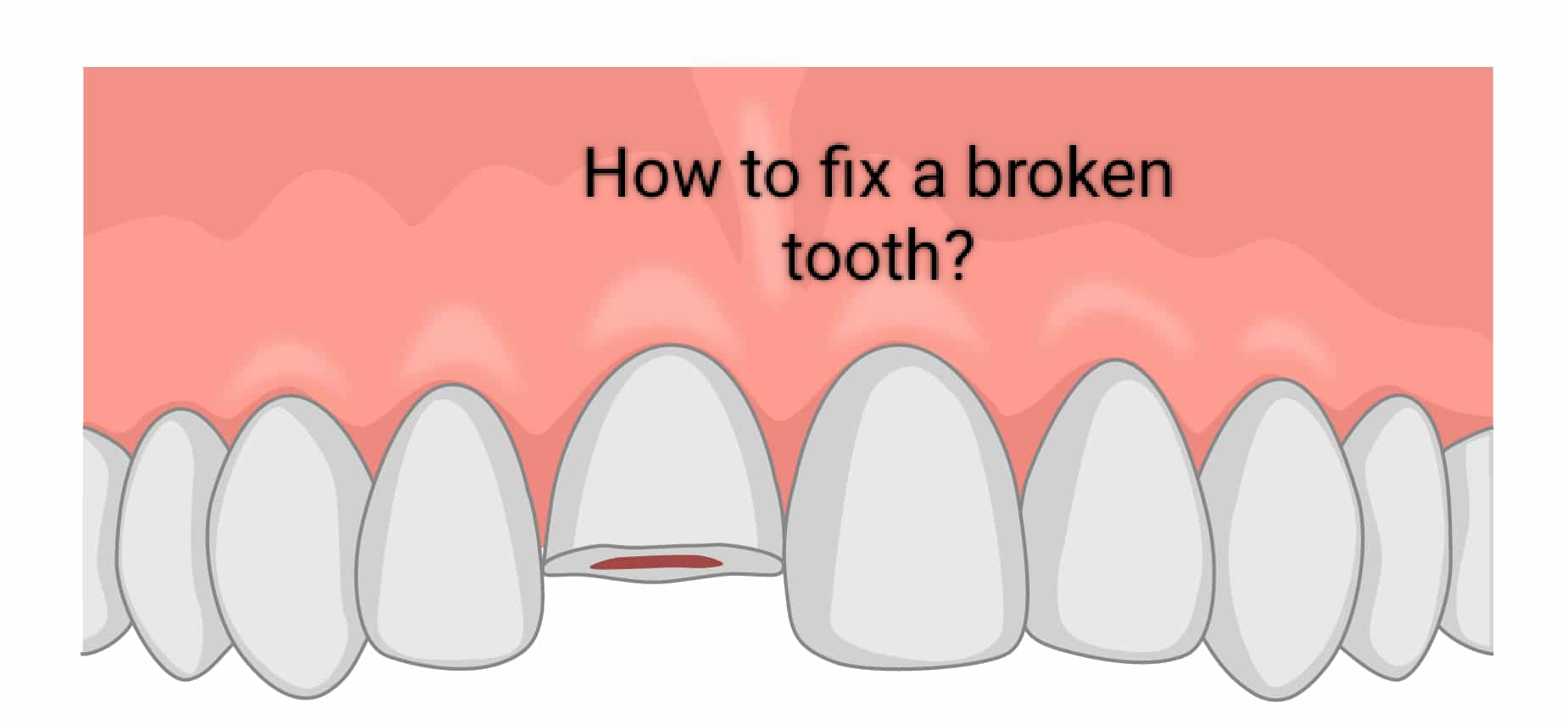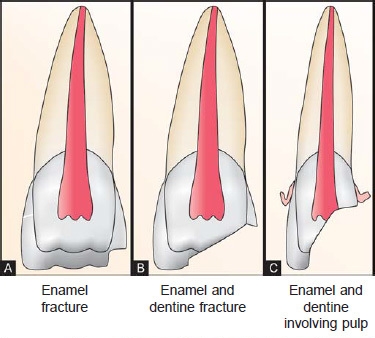What Is a Broken Tooth?
A broken tooth is a tooth that has either chipped, cracked, or fractured. It can occur due to various reasons such as trauma, tooth decay, eating hard or crunchy foods, biting on non-food objects, or dental cavities that weaken the tooth. A broken tooth can be painful and sensitive, and can lead to further dental complications if left untreated. It is important to seek prompt dental treatment if you have a broken tooth.
Problems caused by a Broken Tooth
A broken tooth can cause various problems such as:
1. Pain and sensitivity: A broken tooth can cause pain and sensitivity when exposed to hot or cold temperatures or biting forces.
2. Difficulty chewing: A broken tooth can make it difficult to chew food, especially if it’s a back molar tooth, which is utilized for grinding and chewing.
3. Infection: A broken tooth can lead to infection if the crack or chip extends deep enough to reach the pulp chamber, which contains nerves and blood vessels.
4. Tooth decay: A cracked or chipped tooth can enable bacteria to enter leading to tooth decay.
5. Gum irritation: A sharp or jagged edge of a broken tooth can cause gum irritation and eventually cause gum disease.
6. Aesthetics: A broken tooth can spoil a beautiful smile and detract from one’s confidence.
It’s crucial to fix broken teeth early to prevent such complications.


CAUSES
The causes of a broken tooth are as follows:
1. Trauma: The most common reason for a broken tooth is an accident or injury such as falling or being hit in the face.
2. Teeth grinding: When you grind your teeth, excessive pressure is applied on the teeth, which can cause them to chip and break.
3. Tooth decay: Cavities weaken the structure of the tooth, making them more susceptible to breakage.
4. Biting on hard substances: Chewing on hard objects or candies, or using your teeth as a tool can cause a tooth to break.
5. Age: Teeth weaken as you age making them more prone to breakage.
6. Dental work: Previous dental work, such as fillings or root canals, weakens the tooth’s enamel and can lead to a breakage.
It is important to ensure that preventive measures are taken to avoid broken teeth. These precautions include regular dental checkups, avoiding biting on hard substances, and wearing a mouthguard if you grind your teeth.
How To Treat Broken Tooth
The treatment for a broken tooth would depend on how severely the tooth is broken. Here are some common ways to fix a broken tooth:
1. Dental bonding:
For minor chips, the dentist can use dental bonding material to restore the tooth’s shape. Dental bonding is an application of a tooth-colored resin to the tooth, followed by hardening it with UV light.
2. Dental crown:
If the tooth structure is severely weakened, the dentist may suggest a dental crown. A dental crown is a protective cap that covers a damaged tooth, and it restores the tooth’s functionality and appearance.
3. Root canal treatment:
If the tooth’s pulp is damaged due to the breakage, then a root canal may be necessary. During a root canal procedure, the pulp inside the tooth is removed, cleaned, and sealed.
4. Dental implant:
If the tooth is damaged beyond repair, the dentist may recommend an implant. An implant is an artificial tooth that is anchored to the jawbone.
It is crucial to see a dentist if you have a broken tooth as soon as possible, as delaying treatment can further damage the tooth and could ultimately lead to loss of the tooth entirely.
How To Fix A Broken Tooth At Home
STEP 1: SOFTEN THE SHARP EDGES
While it is essential to seek professional help for a broken tooth, you may want to take action to soften the edges of your sharp broken tooth to avoid further injury to your tongue, cheeks, or gums. Here are some ways to soften the edges of a sharp broken tooth at home:
1. Dental wax:
Dental wax is a common and easy-to-use material that can help to protect your mouth from sharp tooth edges. You can purchase dental wax from your local pharmacy or drugstore. Just place a small amount of the wax on the broken tooth’s sharp edges to cover them.
2. Sandpaper:
Using fine-grit sandpaper (400 or 600 grit), gently sand the sharp edges of the broken tooth to make them smoother. Take care not to apply too much pressure or to grind the tooth surface accidentally.
3. Nail file:
A soft nail file can be used to soften the edges of sharp broken teeth. Gently file the rough edges with the nail file, and use a soft brush to remove any debris or filings.
Remember that these home remedies are only temporary solutions, and a dentist must examine the condition of the broken tooth to determine the best course of treatment.
STEP 2 : ALLEVIATE THE SYMPTOMS -SWELLING AND PAIN
While home remedies may provide temporary relief for broken tooth pain or sensitivity, it is vital to see a dentist for proper treatment. Here are some home remedies that might help to alleviate symptoms associated with a broken tooth:
1. Rinse with saltwater:
A saltwater rinse can help to reduce inflammation and pain associated with a broken tooth. Mix a teaspoon of salt into a cup of warm water and rinse your mouth with it several times a day.
2. Cold compress:
Applying a cold compress to the cheek near the broken tooth can help to reduce pain and swelling. Place a cold compress wrapped in a towel on the cheek for 20 minutes at a time.
3. Over-the-counter pain relievers:
Pain relievers such as ibuprofen or acetaminophen can help to relieve the pain until you visit a dentist. Do not exceed the recommended dosage.
4. Soft foods:
Eating soft foods can help to avoid aggravating the broken tooth. Avoid hot or cold foods or drinks, as they can be painful.
5. Cloves or clove oil:
Cloves or clove oil have natural analgesic properties and can act as a numbing agent when applied to the painful area. Apply a few drops of clove oil or place a small whole clove on the tooth and gently bite down.
Remember that these home remedies only provide temporary relief and do not treat the underlying cause of the broken tooth, so it is essential to consult a dentist as soon as possible.
RELATED ARTICLE : HOW TO FIX A CRACKED TOOTH NATURALLY?
Final word
A broken or chipped tooth can be a painful and worrying experience, but remember that prompt professional treatment is necessary to prevent further damage. While some home remedies like saltwater rinses, cold compresses, and dental wax can provide temporary relief, they cannot address the underlying problem. It is also crucial to avoid using DIY methods or materials, such as using glue or superglue, as they can hurt the teeth and gums. Therefore, for the proper treatment of a broken tooth, you should always consult a dentist. They can suggest the best course of treatment that addresses the specific problem, reduces pain, and restores the tooth’s function and appearance.
FAQs
Here are some frequently asked questions about broken tooth treatment:
Q: What causes a tooth to break or chip?
A: Teeth can break or chip due to various reasons, including accidents or injuries, biting down on hard objects, tooth decay, or weakened tooth structure due to large fillings.
Q: What are the symptoms of a broken tooth?
A: You may experience pain, sensitivity, sharp edges, bleeding, or swelling around the tooth area. Broken teeth can also cause discomfort while chewing, speaking, or opening your mouth.
Q: How do dentists treat a broken tooth?
A: Treatment for broken teeth depends on the extent of damage. Some common treatments include fillings, dental bonding, dental crowns, root canal therapy, or extraction in severe cases.
Q: How can I prevent a broken tooth?
A: You can prevent breaking teeth by avoiding biting on hard objects, maintaining good oral hygiene, attending regular dental checkups, wearing a mouthguard when playing sports, and avoiding grinding or clenching your teeth.
Q: Is a broken tooth a dental emergency?
A: A broken tooth may require emergency dental care if it is accompanied by severe pain, bleeding, or facial swelling. Always consult your dentist immediately if you experience any dental emergency.
Remember, a broken tooth may lead to more severe dental problems if left untreated. Therefore, prompt treatment and regular dental checkups are essential.




